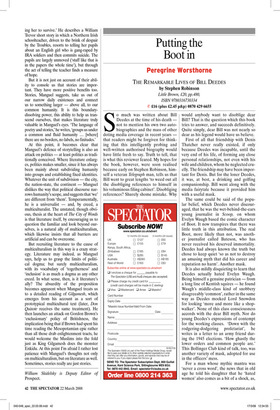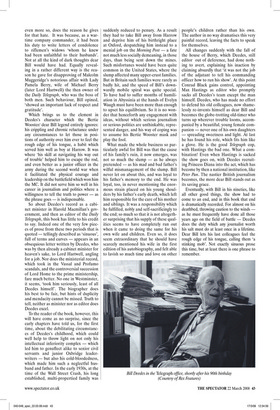Putting the Boot in
Peregrine Worsthorne
THE REMARKABLE LIvES OF BILL DEEDES by Stephen Robinson Little Brown, £20, pp.480, ISBN 9780316730334 ✆ £16 (plus £2.45 p&p) 0870 429 6655 So much was written about Bill Deedes at the time of his death — not to mention his own two autobiographies and the mass of other doting media coverage in recent years — that readers might be forgiven for thinking that this intelligently probing and well-written authorised biography would have little fresh to say. Truth to tell, that is what this reviewer feared. My hopes for the book, however, were soon realised because early on Stephen Robinson, himself a veteran Telegraph man, tells us that Bill went to great lengths ‘to weed out all the disobliging references to himself in his voluminous filing cabinet’. Disobliging references? Shurely shome mistake. Why would anybody want to disoblige dear Bill? That is the question which this book tries to answer, and succeeds definitively. Quite simply, dear Bill was not nearly so dear as his legend would have us believe.
First of all that friendship with Denis Thatcher never really existed, if only because Deedes was incapable, until the very end of his life, of forming any close personal relationships, not even with his wife and children, whom he neglected cruelly. The friendship may have been important for Denis. But for the loner Deedes, it was, at best, a drinking and golfing companionship. Bill went along with the
1 P
media fairytale because it provided him with a useful mask.
The same could be said of the popular belief, which Deedes never discouraged, that he was the wet-behind-the-ears young journalist in Scoop, on whom Evelyn Waugh based the comic character of Boot. It now transpires that there was little truth in this attribution. The real Boot, more likely than not, was another journalist called Bateson, who has never received his deserved immortality. Deedes had always known the truth but chose to keep quiet ‘so as not to destroy an amusing myth that did his career and reputation no harm’. Another mask.
It is also mildly disquieting to learn that Deedes actually hated Evelyn Waugh. Being himself a genuine patrician — from a long line of Kentish squires — he found Waugh’s middle-class kind of snobbery disagreeably ‘common’, rather in the same way as Deedes mocked Lord Snowdon for looking ‘more and more like a shopwalker’. None of this class consciousness accords with the dear Bill myth. Nor do young Deedes’s expressions of contempt for the working classes. ‘Down with the rodgering-dodgering proletariat’, he writes in a letter to an army friend during the 1945 elections. ‘How ghastly the lower orders and common people are.’ This Bollinger Club kind of talk, too, was another variety of mask, adopted for use in the officers’ mess.
For a man whose mythic mantra was ‘never a cross word’, the news that in old age he told his daughter that he ‘hated women’ also comes as a bit of a shock, as, even more so, does the reason he gives for that hate. It was because, as a wartime company commander, it had been his duty to write letters of condolence to riflemen’s widows ‘whom he knew had been unfaithful to their husbands’. Not at all the kind of dark thoughts dear Bill would have had. Equally revealing in a rather different way is the reason he gave for disapproving of Malcolm Muggeridge’s notorious affair with Lady Pamela Berry, wife of Michael Berry (later Lord Hartwell) the then owner of the Daily Telegraph, who was the boss of both men. Such behaviour, Bill opined, ‘showed an important lack of respect and gratitude’.
Which brings us to the element in Deedes’s character which the Bertie Wooster/ dear Bill legend entirely ignores: his crippling and chronic reluctance under any circumstances to let those in positions of authority over him ever to feel the rough edge of his tongue, a habit which served him well as boy at Harrow. It was where ‘his skill at navigating his way out of trouble’ helped him to escape the rod, and even better as a junior officer in the army during the second world war when it facilitated the physical courage and leadership on the battlefield which won him the MC. It did not serve him so well in his career in journalism and politics where a willingness to tell the truth to power — as the phrase goes — is indispensable.
So about Deedes’s record as a cabinet minister in Harold Macmillan’s government, and then as editor of the Daily Telegraph, this book has little to his credit to say. Indeed one of the very few pieces of prose from these two periods that is quoted — tellingly described as ‘sinuous’, full of terms and curves — appears in an obsequious letter written by Deedes, who was by then already a cabinet minister for heaven’s sake, to Lord Hartwell, angling for a job. Nor does the ministerial record, which took in the Vassal and Profumo scandals, and the controversial succession of Lord Home to the prime ministership, fare much better. No one in Westminster, it seems, ‘took him seriously, least of all Deedes himself’. The biographer does his best to be fair, but hints of duplicity and mendacity cannot be missed. Truth to tell, neither as minister nor as editor does Deedes excel.
To the reader of the book, however, this will have come as no surprise, since the early chapters have told us, for the first time, about the debilitating circumstances of Deedes’s childhood, which could well help to throw light on not only his intellectual inferiority complex — which led him to genuflect alike to senior civil servants and junior Oxbridge leaderwriters — but also his cold-bloodedness, which made him such a neglectful husband and father. In the early 1930s, at the time of the Wall Street Crash, his long established, multi-propertied family was suddenly reduced to penury. As a result they had to take Bill away from Harrow and deprive him of his birthright place at Oxford, despatching him instead to a menial job on the Morning Post — a fate not much less socially demeaning, in those days, than being sent down the mines. Such misfortunes would have been quite common in the United States, where the slump affected many upper-crust families. But in Britain such families were rarely as badly hit, and the speed of Bill’s downwardly mobile spiral was quite special. To have had to suffer months of humiliation in Abyssinia at the hands of Evelyn Waugh must have been more than enough to upset his equilibrium. So it is no wonder that henceforth any engagement with ideas, without which serious journalism or serious politics are unthinkable, represented danger, and his way of coping was to assume his Bertie Wooster mask and play the fool.
What made the whole business so particularly awful for Bill was that the cause of his family’s ruin, it now emerges, was not so much the slump — as he always pretended — as his mad and bad father’s wilful mismanagement of the slump. Bill never let on about this, and was loyal to his father’s memory to the end. He was loyal, too, in never mentioning the enormous strain placed on his young shoulders by his father’s early death, which left him responsible for the care of his mother and siblings. It was a responsibility which he fulfilled, nobly and self-sacrificingly to the end; so much so that it is not altogether surprising that his supply of these qualities seems to have completely run out when it came to doing the same for his own wife and children. Even so, it does seem extraordinary that he should have scarcely mentioned his wife in the first edition of his autobiography, and felt able to lavish so much time and love on other people’s children rather than his own. The author in no way dramatises this very painful record, leaving the facts to speak for themselves.
All changes suddenly with the fall of the house of Berry, which Deedes, still editor out of deference, had done nothing to avert, explaining his inaction by claiming absurdly that ‘it was not the job of the adjutant to tell his commanding officer how to run his show’. At this point Conrad Black gains control, appointing Max Hastings as editor who promptly sacks all Deedes’s team except the man himself. Deedes, who has made no effort to defend his old colleagues, now shamelessly re-invents himself as dear Bill and becomes the globe-trotting old-timer who turns up wherever trouble looms, accompanied by a beautiful, young female companion — never one of his own daughters — spreading sweetness and light. At last he has found his role, which fits him like a glove. He is the good Telegraph cop, with Hastings the bad one. What a combination! Even when Hastings is sacked the show goes on, with Deedes recruiting Princess Diana into the act, which has become by then a national institution, like Peter Pan. The nastier British journalism becomes, the more dear Bill stands out as its saving grace.
Eventually, with Bill in his nineties, like all other good things, the show had to come to an end, and in this book that end is dramatically recorded. For almost on his deathbed, throwing caution to the winds — as he must frequently have done all those years ago on the field of battle — Deedes does the duty which any journalist worth his salt must do at least once in a lifetime. Dear Bill lets his last colleagues feel the rough edge of his tongue, calling them ‘a stinking mob’. Not exactly sinuous prose this time, but at least there is one phrase to remember.



















































































 Previous page
Previous page